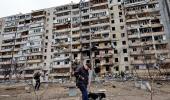Whether it liked it or not, the Ukraine crisis forced India to choose between the aggressor Russia and the US-led free world, a decision it hated to make, Virendra Kapoor point out.

Those of a certain age will recall what has come to be known as the Cuban Missile Crisis.
In 1962, then US president John Kennedy challenged his Soviet counterpart Nikita Khrushchev to remove the nuclear missiles in Cuba at the pain of an open nuclear confrontation.
Thirteen days later, Khrushchev blinked, leaving a fuming Fidel Castro muttering 'surrender.'
Kennedy argued that only ninety miles separated the US from Cuba. The Soviet missiles made the eastern region of the US vulnerable.
Much of the free world at the height of the Cold War cheered Kennedy for showing down the rival superpower, though in the process he openly undermined Cuba's sovereignty.
But why is the same free world now up in arms when President Putin seeks to secure what he considers his sphere of influence?
After all, the rival US-led NATO defence alliance creeping ever closer on Russia does pose a huge security challenge to it, doesn't it?
Unfortunately, history is a poor guide in these matters.
For in 1956, the same Khrushchev had ordered tanks in Budapest when Hungary tended to break free from the shackles of the Soviet empire.
The Soviet tanks exited only after ensuring the replacement of the pro-freedom prime minister Imre Nagy by a puppet.
Again in 1968 the Soviet troops marched in Prague, putting down the nascent freedom movement.
Why, go that far? In 2008, Putin himself attacked Georgia, then an independent republic, to end its pro-NATO tilt.
The short point is that high-falutin' principles of national sovereignty and independence are only for the weak.
Powerful leaders with deadly nuclear arsenals at their command pursue their own agendas unmindful of the UN Charter.
Therefore, if the US could not, would not, countenance Soviet nuclear missiles in its backyard, why should it goad Ukraine to flirt with NATO, knowing full well it would rile Putin?
Arguably, NATO is essentially a defensive alliance against the collective threat that Western Europe perceived from the then Soviet Union.
It has not attacked another nation since its founding in 1949, the foundational principle being to treat an attack on one member-State as attack on all and to defend it with all its might.
The counter post-War Warsaw pact guaranteed the defence of east European states.
But once the Soviet Union disintegrated in December 1991, breaking into 15 independent republics, the West has expanded its influence east-ward.
It is this which Putin desperately seeks to undo, wanting to move the clock back to gather once again the former Soviet provinces under the Russian Federation.
The former KGB agent does suffer from delusions of grandeur. Having put down with an iron hand any trace of domestic opposition, he now exploits growing dissonance in US politics to implement his vision of a greater Russia.
Meanwhile, since the fall of the Soviet Union, several former Warsaw Pact members like Poland, Hungry, Czech Republic, Bulgaria, Romania, etc have joined NATO.
Others, including Ukraine, are in the queue.
Putin raged at these moves to contain Russia while the West pro-forma denied any hostile motive.
Of course, there can be no defence of Putin's actions in the last few days.
Typically, he has acted like a power-drunk autocrat, humiliating a nation of 40 million-plus people whose only mistake was that they preferred the free, democratic way to organise their affairs rather than the sham democracy that 140 million Russians are condemned to live under perennially.
In retrospect, Ukrainians would regret parting with the third-largest arsenal of nukes in 1994, trusting the assurances of the US and Russia to safeguard their security.
Putin may have also feared a flourishing democracy at his doorstep.
Lest the democratic boilerplate which made it possible for a former comic like Volodymyr Zelenskyy to be elected as Ukraine's president infect the long-suffering Russian masses, Putin moved to destabilise Ukraine.
Further, what was proving potentially troublesome for Putin and his coterie of billionaire oligarchs was the better economic condition of ordinary Ukrainians than those of Russians.
Though in his 22nd year in power, the Russian strongman had failed to improve the lot of ordinary Russians who still suffer from economic deprivations.
Instead of bread, he periodically offers them the emotional salve of nationalism, expanding the Russian borders by annexing, in 2014, the Ukrainian enclave of Crimea, taming Georgia and turning Belarus into a puppet State.
The 30,000 Russian troops stationed in Belarus attacked Ukraine last week. As widely feared, the US-led NATO did little to protect Ukraine against Putin's aggression. Last-minute supply of weapons proved woefully inadequate in repulsing the Russians.
Of course, there was a Niagara of words in sympathy to the beleaguered Zelenskyy.
However, the much-ballyhooed economic and financial sanctions are unlikely to bite.
Putin seems to have got what he wants.
Following the pummeling of Ukraine from land, sea and air, when the conquering dictator sits down to negotiate peace, the only item on the agenda would be removal of the pro-West Zelenskyy and replacement by a Russian puppet.
Once that is achieved, like Belarus and other hitherto independent former Soviet republics, Moscow will dictate their domestic and foreign policies.
The US-led free world would have suffered yet another rebuff after the recent humiliation in Afghanistan.
With a rising China, and Putin's Russia creeping closer to it, the diminution of US influence in global affairs would force a rethink in the capitals of the free world.
As for India, whether it liked it or not, the Ukraine crisis forced it to choose between the aggressor Russia and the US-led free world, a decision it hated to make. In the end, it abstained from the vote in the Security Council.
Though India has come a long way from the time when it was virtually a member of the Soviet bloc during the Cold War years, its abstention on the Ukrainian vote underlines her continuing, though slowly diminishing, reliance on Russia for military hardware.
Despite the recent embrace of the US-led Western alliance such as the Quad to safeguard collective interests in the Indo-Pacific against an aggressive and expansionist China, India will still have to tip-toe gingerly between the rival world powers.
Russia itself is drawing closer to China, a clear failure of US diplomacy.
Significantly, Pakistan seems to have moved fully from being a puppet of the US to being a puppy of China.
For any other sovereign head of State it would have been a slap in the face for Russia to attack a fellow independent nation, but Imran Khan pow-wowed with Putin in Moscow even as Russian tanks rolled into Ukraine.
Clearly, Pakistan has abandoned even the pretence of being a free nation, sinking as it is under a mountain of global debt.
Feature Presentation: Aslam Hunani/Rediff.com











 © 2025
© 2025